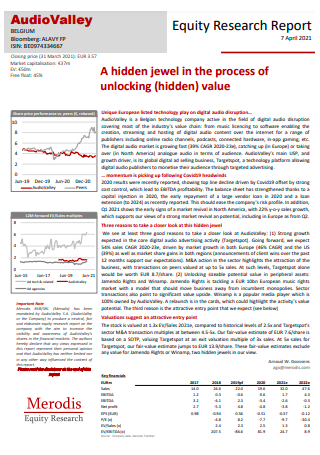In the dynamic world of finance, comprehending financial movements can seem like attempting to find your way through a labyrinth without a guide. Equity research analysts play a key role in this landscape, providing analysis and predictions that help financial participants make informed decisions. By analyzing corporate performance, economic conditions, and financial indicators, these experts offer a sharper view of what lies ahead, enabling persons and organizations alike to seize new opportunities.
For those looking to achieve an advantage in their investment strategies, leveraging the knowledge of equity analysts can be a turning point. With their deep understanding of financial metrics and trends, these specialists decode complex market events, transforming intricate data into practical insights. Regardless of whether you are a experienced investor or just starting out, partnering with equity research specialists can help you work through unpredictabilities and identify potential expansion opportunities, making your financial journey more knowledgeable and potentially more profitable.
Understanding Equity Evaluation
Stock analysis is a key process that entails evaluating the fiscal health and performance potential of listed companies. Analysts use various approaches to evaluate a company's stock, including fundamental analysis and technical analysis. Fundamental analysis focuses on financial statements, economic conditions, and industry trends, while technical analysis emphasizes price movements and trading volumes. By integrating these methods, equity evaluators can provide insights into the future behavior of a stock.
Stock analysts consider several elements when conducting their evaluation. They review a company's sales increase, profitability, and liquidity, as well as macroeconomic indicators that could affect the company's results. In addition, evaluators assess competitive standing within the sector, comparing how a company measures up against its competitors. This holistic approach allows investors to arrive at informed choices about purchasing, holding, or selling shares.
The primary goal of stock evaluation is to establish the true worth of a company's shares. Evaluators create target prices for shares based on their results and offer advice to investors. By leveraging the knowledge of stock analysis experts, investors can gain a better understanding of market trends and capitalize on potential investment opportunities. This knowledge can be crucial in navigating the intricacies of the market landscape and enhancing investment approaches.
Key Metrics for Market Developments

Grasping crucial figures is essential for equity analysts in analyzing market dynamics. One of the core metrics is EPS. This figure indicates a company's financial performance on a per-share basis, allowing analysts to evaluate the earnings of different companies within the same industry. A consistently growing EPS can indicate a robust financial position, attracting investors and impacting stock prices positively.
Moreover, a crucial metric is the price-to-earnings ratio, or price-to-earnings ratio, which offers clarity into how much investors are prepared to spend for a single dollar of earnings. A elevated P/E ratio may suggest that the market anticipates future growth, while a reduced P/E may suggest an inexpensive stock. Analysts often use this ratio in tandem with the company's historical performance and industry averages to make well-considered investment decisions.
In conclusion, the ROE, is an essential measure that reflects how effectively a company is utilizing its equity to produce profits. A high ROE shows that the company is capable at providing returns for shareholders, while a diminished ROE can signal concerns about its business efficiency. By analyzing these metrics, equity analysts can deliver insightful insights into market dynamics and help investors make informed investment decisions.
The Significance of Analysts in Stock Market Investment
Stock analysts play a crucial role in assisting investors traverse the intricacies of the stock market. Their primary responsibility is to assess the financial health of businesses, making educated predictions about prospective performance based on extensive research and evaluation. By analyzing financial reports, market fluctuations, and industry changes, these specialists provide invaluable insights that can help investors make sound decisions.
Additionally, equity analysts often create detailed reports that outline their findings and offer advice on whether to purchase, divest, or hold stocks. These reports serve as useful resources for individual investors and professional clients alike, enabling them to understand the underlying factors impacting stock prices. Also, analysts frequently participate in dialogues with company management and industry leaders, providing them with a better understanding of market dynamics and possible risks.
Ultimately then, the expertise of equity analysts can greatly enhance an investor's ability to leverage on market opportunities. By leveraging equity research report and market knowledge, investors can better position themselves for success. This collaboration between analysts and investors fosters a better informed investment landscape, leading to potentially better financial outcomes.
